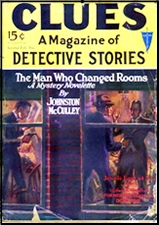Wed 25 Mar 2020
Pulp Stories I’m Reading: JOHNSTON McCULLEY “The Man Who Changed Rooms.â€
Posted by Steve under Pulp Fiction , Stories I'm Reading[6] Comments
JOHNSTON McCULLEY “The Man Who Changed Rooms.†Novelette. Creighton Marpe #1. First published in Clues, February #2, 1929. Collected in The Johnston McCulley Megapack (Wildside Press, Kindle edition, March 2015).

Johnston McCulley is known today, if at all, as the creator of the pulp western hero Zorro, and if it hadn’t been for Walt Disney, even such a dashing character as Zorro may be unknown to readers as some of the other series characters he came up with. Only the most dedicated collectors of old pulp magazines will remember these folks: Black Star, The Spider (the earlier version), The Mongoose, Thubway Tham, Green Ghost, The Thunderbolt, The Avenging Twins, and The Crimson Clown.
He also wrote hundreds of standalone stories for the pulp magazines in all genres but primarily mysteries and westerns, along with several dozen hardcover novels. As for secret agent Creighton Marpe, I’ve listed this as his first story, but in fact, while there are possibilities in the character, it seems as though there never was another one.
His task in “The Man Who Changed Rooms†is outwardly a simple one. He’s to take the train from New York City to Kansas City, pick up a top secret document, and bring it back to Manhattan. A job to be completed with code words and the utmost caution. The reason Creighton Marpe is called “the man who changed rooms†is that when he needs a room in a hotel, he books three, and when he buys tickets for a train, he buys at least two.
Along the way he runs across various operatives for the other side, whom he invariably taunts in jaunty carefree fashion. Also along the way his path crosses that of a fellow agent on his side, Alla Stimney, a young woman he is rather fond of, a fact that causes them problems when both are being held captive by the aforementioned other side.
There is no depth to the story, nor is the prose anything but rudimentary. but it’s told in such breakneck fashion, the non-sophisticated reader may not even notice. Of course you must realize that I’m paid to notice such things, but somehow or another, I enjoyed the story anyway. Stories taking place largely on trains often have that effect on me.
March 25th, 2020 at 7:16 pm
This tale sounds fun.
Had never heard of it.
I’ve long recommended hid novel:
Who Killed William Drew? (1917)
It’s a pretty good mystery.
March 25th, 2020 at 8:02 pm
“when he needs a room in a hotel, he books three, and when he buys tickets for a train, he buys at least two.”
I wonder how Marpe justified his claims for expenses.
March 25th, 2020 at 9:07 pm
Success on all counts. There’s nothing better. Either that or he was independently wealthy
March 25th, 2020 at 8:24 pm
Thubway Tham is easily the best of McCulley, though there is a bit of fun to be found in the Crimson Clown, Avenging Twins, Black Star, and the Spider, and he wrote some good Westerns.
He’s a successful pulpster, not a particularly memorable writer most of the time (most of the Zorro stories are rather pedestrian too), but he is professional and it’s fairly obvious what pulp editors saw in his work.
March 25th, 2020 at 9:10 pm
I have found a little Thubway Tham goes a long way, at least for me. EQMM used to reprint a lot of them. I haven’t read enough of the other charterers to have an opinion. As for his Zorro stories, they were OK, but Guy Williams did it better. Brought him to life, you might say.
March 25th, 2020 at 10:02 pm
I never liked the Thubway Tham tales that EQ reprinted either.
Not offensive – but not good either.
There are LOTS of good Zorro movies.
Both the Doug Fairbanks and Tyrone Power versions are wonderful.
I grew up on Guy Williams too!